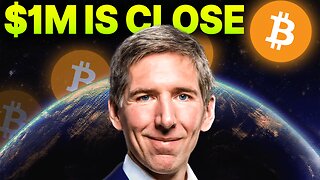Premium Only Content

Mass Arrests in New Jersey Expose Widespread Corruption and International Crime Network
In a sweeping operation, the FBI has taken into custody a staggering number of individuals, including prominent mayors, politicians, and religious leaders, as part of a decade-long investigation into corruption, money laundering, and human organ trafficking. The arrests, requiring buses to transport those detained, have sent shockwaves through New Jersey and beyond.
A State Plagued by Corruption
New Jersey’s political landscape has long been marred by corruption, but this operation reveals a scale that is unprecedented even for a state with such a reputation. “Corruption is not only pervasive; it has become ingrained in New Jersey’s political culture,” authorities stated. The arrests come as the latest in a series of scandals that have seen over 130 public officials convicted or pleading guilty to corruption-related charges in the past decade.
The sheer breadth of those implicated underscores the systemic nature of the problem. “The list of people we arrested sounds like it should be the roster for a meeting of community leaders,” an FBI official said. “But sadly, they weren’t meeting in a boardroom this morning. They were in the FBI booking room.”
Religious Leaders at the Center of the Scandal
Among those arrested were prominent rabbis accused of using religious charities to launder millions of dollars. These charities, intended to serve communities, allegedly became conduits for criminal enterprises spanning the United States, Switzerland, and Israel.
Perhaps most shocking is the revelation that one rabbi had been trafficking in human kidneys for over a decade. Prosecutors allege he purchased organs from vulnerable individuals for a pittance, only to sell them for exorbitant profits to those in desperate need of transplants. This grim enterprise highlights the global reach of the corruption and the exploitation of marginalized people for financial gain.
International Money Laundering and Human Trafficking
The investigation uncovered a sophisticated network of international money laundering operations, funneling illicit funds across borders. Authorities have linked the crimes to organized groups exploiting legal loopholes and using religious organizations as fronts. The scale of the operation extends far beyond New Jersey, implicating financial institutions and individuals in Switzerland and Israel.
Public Outrage and Calls for Reform
For New Jersey residents, the news has reignited longstanding frustrations with the state’s deeply entrenched culture of corruption. “It just goes back to the belief that Hudson County is incredibly corrupt, and I thought we were making progress in becoming less corrupt,” one resident lamented.
The arrests have also prompted renewed calls for systemic reform, including stricter oversight of political and religious institutions and harsher penalties for corruption-related offenses. As public confidence continues to erode, community leaders are urging swift action to restore faith in governance.
A Legacy of Corruption
New Jersey’s sordid history of political scandals makes this operation both shocking and, sadly, unsurprising. In the last decade alone, over 130 public officials have been convicted or pleaded guilty to corruption charges. This latest bust reveals how deeply embedded the problem has become, with criminal activity festering in the very institutions meant to serve and protect the public.
A Moment for Accountability
As the investigation continues, authorities are emphasizing the need for accountability at every level of society. The arrests, while a significant step, represent only the tip of the iceberg in dismantling the networks of corruption and exploitation that have flourished for years.
“This is a wake-up call,” an FBI spokesperson said. “Corruption and exploitation, no matter how deeply rooted, will not be tolerated. We are committed to bringing all those responsible to justice.”
For the people of New Jersey, the hope is that this moment marks the beginning of genuine reform—one that not only exposes corruption but also rebuilds trust in their leaders and institutions.
-
 27:51
27:51
FragmentsOfTruth
3 days agoThe Hidden Brotherhood of Science: From Geology to Eugenics and the Secret Societies Behind It All
2231 -

Drew Hernandez
11 hours agoLGBTQ TERRORIST EXECUTES CATHOLIC KIDS IN MINNEAPOLIS
11.3K12 -
 2:17:08
2:17:08
FreshandFit
6 hours ago10 Top Red Pills About American Women
44.4K18 -
 2:10:26
2:10:26
Badlands Media
12 hours agoDevolution Power Hour Ep. 384: Durham’s Blind Spots, Soros Panic, and Trump’s Economic Warfare
59.6K27 -
 3:17:28
3:17:28
TimcastIRL
6 hours agoTrans Shooter Targets Catholic Kids In Mass Shooting, Leftists Reject Prayers | Timcast IRL
220K62 -
 1:31:29
1:31:29
Brandon Gentile
1 day ago25 Year Wall Street INSIDER: $1M Bitcoin Soon Is Just The START
18.2K -

SpartakusLIVE
8 hours ago#1 Birthday Boy Celebrates with MASSIVE and HUGE 4.8-Hour Stream
50.9K -
 55:54
55:54
Man in America
9 hours agoFrom Oil Barons to Pill Pushers: The Rockefeller War on Health w/ Jeff Adam
47K6 -
 3:02:18
3:02:18
Barry Cunningham
6 hours agoBREAKING NEWS: PRESIDENT TRUMP THIS INSANITY MUST END NOW!
92.8K181 -
 3:58:27
3:58:27
StevieTLIVE
5 hours agoWednesday Warzone Solo HYPE #1 Mullet on Rumble
37.8K